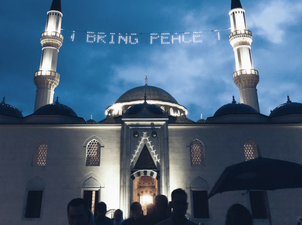
Ramadan: Hungry for Spiritual Growth
Mehreen Karim
May 24, 2018
WHO: My elementary school teachers couldn’t fathom why a 9 year old kid would be ecstatic to wake up at unkind hours of the morning, only to begin a day long fast from food and water. Fourteen years later, my adult peers grapple with the same doubts when hearing that Muslims voluntarily fast and actually reap boundless pleasures and joys from Ramadan. As one of the foundational practices of Islam, all Muslims in good health (excluding children and those that are pregnant, nursing, ill, or menstruating), are required to participate in fasting during Ramadan. That’s at least a billion Muslims.
WHAT: Ramadan is one of the holy months in the Islamic lunar calendar. Muslims fast from dawn till dusk every day of this month. By abstaining from food, water, and sinful behavior, Muslims devote their entire days to purging bad habits and implementing better ones. From a young age, I fell in love with Ramadan for its heart-changing virtues. I was, in fact, the 9-year-old that loved to rally her siblings at 5 AM to sleep-eat breakfast foods and chug glasses of water. And at every sunset, I was comforted by the sight of family coming together for the sole purpose of breaking fast and praying together—no questions asked—for thirty days.
WHEN: Ramadan marks the ninth month in the Islamic lunar calendar. Historically, God revealed the first verses of the Quran to the Prophet Muhammad (peace be upon him) during the month of Ramadan.
WHERE: Muslims are fasting in every country around the world. You can find us breaking fast at home, a restaurant, or at any local mosque. Every night of Ramadan, communities come together at local mosques to provide a free dinner to all who wish to join. If you ever want to experience the foods, customs, and hospitality of Muslims during this blessed month, drop by a mosque near you at sunset!
WHY: Thirty days of restraining from food, and yes, even water, comes off as an unreasonable and often dreadful experience to the average onlooker. However, the physically challenging practices of Ramadan rarely compare in difficulty to the equally crucial practices of self-improvement and spiritual growth. Holding off on a staff lunch is a cakewalk (pun intended) in comparison to holding off from lying, backbiting, jealousy, greed, and every other toxic sentiment you may come by in a regular day. The mental challenge of fasting from one’s bad habits and inner demons is perhaps the most taxing, and therefore, the most cleansing form of self-restraint Ramadan enables. When understanding the “why” of Ramadan, one must correct a common misconception: to restrain oneself is not to deprive oneself. Reward lies in restraint.
When fasting, we are dusting off our relationship with God— polishing it with the utmost attention to detail. We reflect on the crevices in our faith, noting that each crevice is proof that there is only ever more room to grow towards our Creator. The greatest unsung truth about Ramadan is this– Muslims dedicate 30 days of the year to forging heights in our spirituality, expanding the bounds of our mental health, and living out our love for God in honest self-revelation.







